Rain water versus city water for health of plants
miastern
15 years ago
Featured Answer
Sort by:Oldest
Comments (25)
Kimmsr
15 years agolast modified: 9 years agojoepyeweed
15 years agolast modified: 9 years agoRelated Professionals
Camas Landscape Architects & Landscape Designers · Carson Landscape Architects & Landscape Designers · Ferndale Landscape Architects & Landscape Designers · Clearlake Landscape Contractors · Edinburg Landscape Contractors · Elmhurst Landscape Contractors · Lorain Landscape Contractors · New Berlin Landscape Contractors · Whitehall Landscape Contractors · Winchester Landscape Contractors · Clermont Decks, Patios & Outdoor Enclosures · Estero Decks, Patios & Outdoor Enclosures · Lenexa Decks, Patios & Outdoor Enclosures · Lincolnton Decks, Patios & Outdoor Enclosures · St. Louis Decks, Patios & Outdoor Enclosuressudzy
15 years agolast modified: 9 years agojoepyeweed
15 years agolast modified: 9 years agoThe Jungle Explorer
12 years agolast modified: 9 years agoKimmsr
12 years agolast modified: 9 years agogargwarb
12 years agolast modified: 9 years agogonebananas_gw
12 years agolast modified: 9 years agofeijoas
12 years agolast modified: 9 years agoBelgianpup
12 years agolast modified: 9 years agogargwarb
12 years agolast modified: 9 years agogonebananas_gw
12 years agolast modified: 9 years agogargwarb
12 years agolast modified: 9 years agoBelgianpup
12 years agolast modified: 9 years agogargwarb
12 years agolast modified: 9 years agonovascapes
12 years agolast modified: 9 years agoKimmsr
12 years agolast modified: 9 years agogargwarb
12 years agolast modified: 9 years agoKimmsr
12 years agolast modified: 9 years agogonebananas_gw
12 years agolast modified: 9 years agogargwarb
12 years agolast modified: 9 years agogreenleaf_organic
12 years agolast modified: 9 years agocurt_grow
12 years agolast modified: 9 years agourbanminimalist
12 years agolast modified: 9 years ago
Related Stories

GREEN BUILDINGJust Add Water: Rain Barrel Magic
Take your rainwater storage from practical to beautiful with a new breed of design-friendly rain barrels
Full Story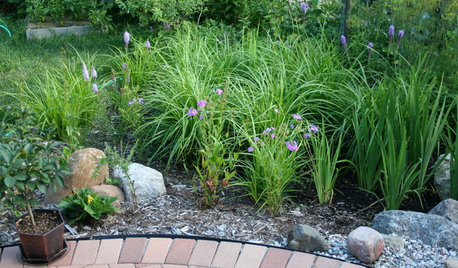
LANDSCAPE DESIGNHow to Site and Size a Rain Garden for Your Landscape
Installing a rain garden is an excellent way to reduce runoff and return water to its source
Full Story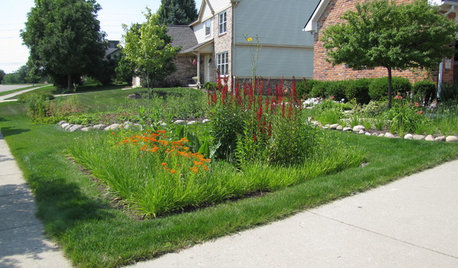
LANDSCAPE DESIGNHow to Shape a Rain Garden and Create the Right Soil for It
Learn how to grade, lay out and amend the soil in your rain garden to support your plants
Full Story
GARDENING GUIDES8 Unthirsty Plants Help You Save Water in Style
Spend less effort and money on your landscape with drought-tolerant and native plants that liven up your yard
Full Story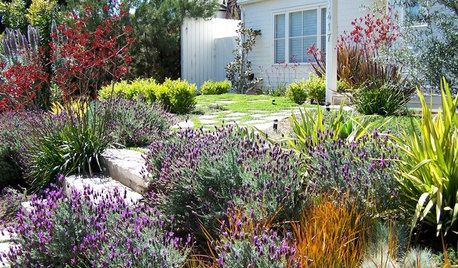
SAVING WATERGreat Plants for Lush, Low-Water Gardens
Water restrictions making your garden look washed out? Give it living color with unthirsty grasses, flowers and succulents
Full Story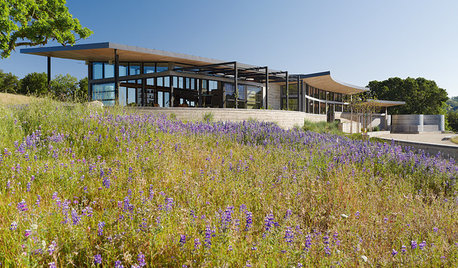
GREEN BUILDINGModern Design Captures Valuable Rain
Instead of letting a precious natural resource trickle away, these architectural features make the most of it
Full Story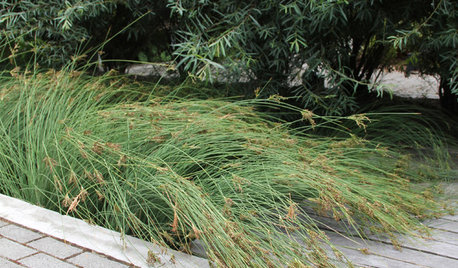
GARDENING GUIDESProtect a Precious Resource With a Rain Garden
Promote pure water and a beautiful landscape with a garden design that makes the most of the rain
Full Story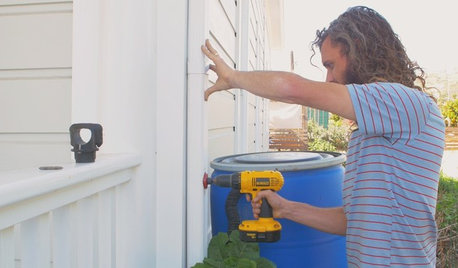
HOUZZ TVHouzz TV: How to Install a Rain Barrel
This DIY tutorial shows how easy it can be to capture rainwater from your roof to use in your garden later
Full Story
GARDENING FOR BUTTERFLIES3 Ways Native Plants Make Gardening So Much Better
You probably know about the lower maintenance. But native plants' other benefits go far beyond a little less watering and weeding
Full Story
LIFEThe Top 5 Ways to Save Water at Home
Get on the fast track to preserving a valuable resource and saving money too with these smart, effective strategies
Full Story







pnbrown